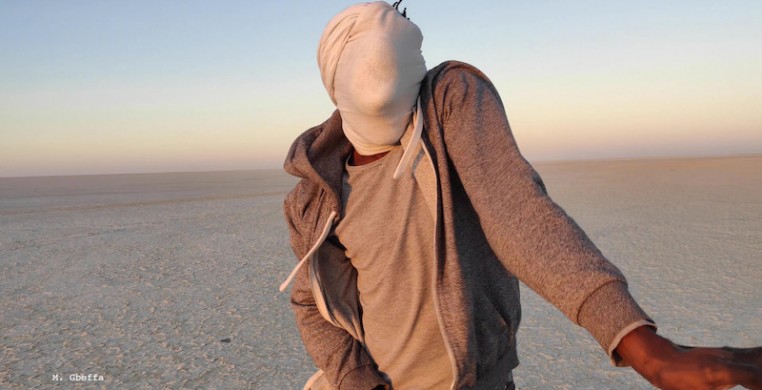Thobile Maphanga, curator mentee for this year’s JOMBA! Contemporary Dance Experience, introduced the African Crossings Platform by reminding viewers of a crucial festival directive: creating connections with some of Africa’s most prominent, groundbreaking and inspiring dancemakers. The program, which featured four commissioned screen dance films from Robert Ssempijja (Kampala, Uganda), Bernardo Guiamba aka Pak Ndjamena (Maputo, Mozambique), Gaby Saranouffi (Antananarivo, Madagascar) and Marcel Gbeffa (Cotonou, Benin), certainly delivered on this imperative.
The evening began with Ssempijja's 15-minute dance film, “Alienation.” Ssempijja contextualized his work as a response to the structural design of his home city, Kampala, Uganda. Specifically, the persistence of colonial planning schemes that continue to drive a wedge between notions of home and belonging. Ssempijja described this tension as “a conflict between exterior and interior.” His exterior knew the city, but his interior could no longer connect to it.
Surrounded by a landscape of deteriorating infrastructure, Ssempijja falls into a repetition of collisions with a concrete pillar, rebounding into and off the unforgiving surface with jarring stiffness. These magnetized repulsions are interrupted by a camera zoom to layered white material in the distance. A human leg inches out from underneath the fabric’s edge. The camera zooms back out. Ssempijja lifts his palm to a column but replaces the point of contact with his head. He smears the entire left side of his face laboriously against the concrete as he descends downwards. He cannot physically get any closer to the structure, yet his shifting focus suggests distance: “What am I? When I was young, I related to everything. Now I find myself disconnected. Is it me? Or is it the city that has rejected me?”
Next up was “IN-BOX!!”, a collaboration between multifaceted artist Bernardo Guiamba “Pak Ndjamena” and filmmaker Ivan Barros. These Mozambican artists approached JOMBA!’s curatorial provocation of border crossings in terms of everyday barriers and spaces that the body is present in/fluctuates between such as land, roads, houses, clothes, sand, light, shadow, memory, voice and more. The short film tracks Guiamba’s journey across multiple locations including the white lines of a smoothly paved road, the towering slopes of red sand, the vacant interiors of high-rise buildings, the narrow corridors between dwellings, the upper ring of an open-air stadium, the inside of a proscenium theatre and beyond. Guiamba’s virtuosic embodiment of his many areas of expertise as a dancer, choreographer, musician, actor and cultural promotor cultivated in a moving and cohesive narrative bookended by voice-overs of an affectionate letter addressed to hope: “It’s been a long time since I felt you around….”
Saranouffi’s “FACE(S) OF BASADI,” an art installation-turned-short film, explores rites of passage for women in Africa as pillars of identity. White fabric, illuminated by an internal glow and surrounding darkness, envelopes her, obscuring her body from sight. Saranouffi’s arms and crown of head breach a central opening of the enclosure. The excavation continues as a red canopy of fabric drapes over the white covering. Is there symbolism of blood here? If so, what does it signal? Menstruation? Loss of virginity? (Re)birth? Saranouffi lifts her veil to momentarily reveal her face. Her joyous smile cuts through Pascal Raymond’s eerily provocative soundscape. She continues to luxuriate in and out from under the covering at the pace of her own impulses. A nod to her introduction of the work as focusing on female empowerment: “As I move in and out of patterns, my face remains the same.”
The program concludes with Gbeffa’s “In my mind.” This screen dance offers an escape from the pandemic’s physical limitations through a series of dreams and hallucinations. In contrast to the centering of body as the vessel for movement across literal and figurative borders in the other three commissioned pieces, he prioritizes the mind as passageway for transport. Crossfading of the frames between red-tinted, balanced and hyper-exposed/x-ray-like coloring mark transitions between different dream-states in the film. These post-production effects conceal Gbeffa’s face (as does the wrapping of a pillowcase/t-shirt around his head throughout much of the film), further obstructing the viewers sense of reality.
From Uganda to Mozambique to Madagascar to Benin, these works crossed at the intersection of vulnerability and resilience. The four commissioned dance films of the “African Crossings” platform place faith in the human body, mind and spirit as both sites and tools for unearthing historical underpinnings of the continent and articulating their contemporary reverberations.
--
The JOMBA! Contemporary Dance Experience continues with daily shows online through Sept. 5. For more information and to access the performances, visit jomba.ukzn.ac.za.

2021 Critical Dance Writing Fellow Sophie Allen is a Chicago-based dance artist and arts administrator. She pushes gender, playfulness and absurdity to the forefront of her creative work and is fascinated by acts of subversion, confrontation, confession and concealment in performance—specifically for the purpose of reimagining personal and collective histories. Sophie holds a dual degree from the University of Michigan, where she earned her BFA in Dance and BA in Philosophy, Politics and Economics (PPE). Her recent projects include: 2021 Artist-in-Residence with the Going Dutch Festival, production assistant for Jennifer Harge and dramaturg for Mira Göksel. Sophie is honored and excited to deepen her engagement with the field as a critical dance writing fellow with See Chicago Dance.

